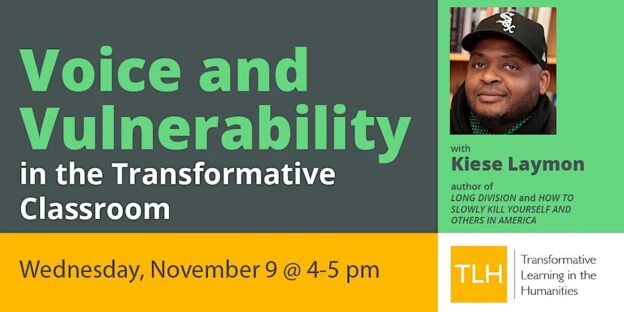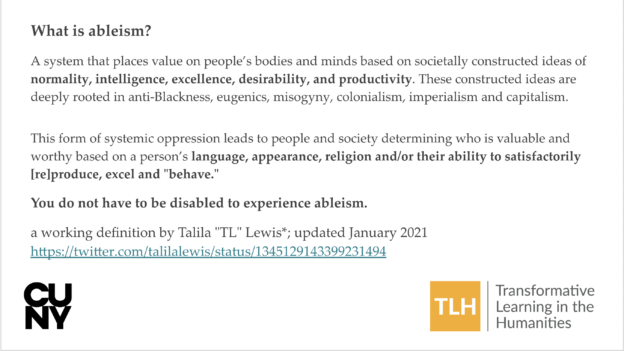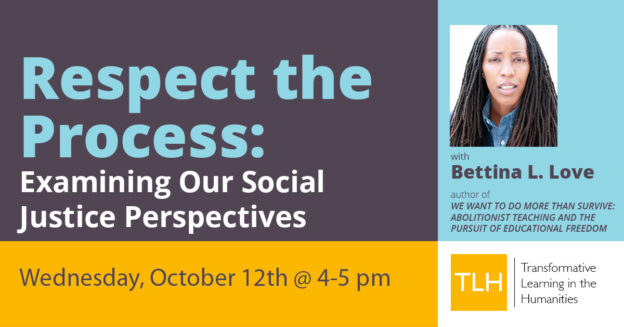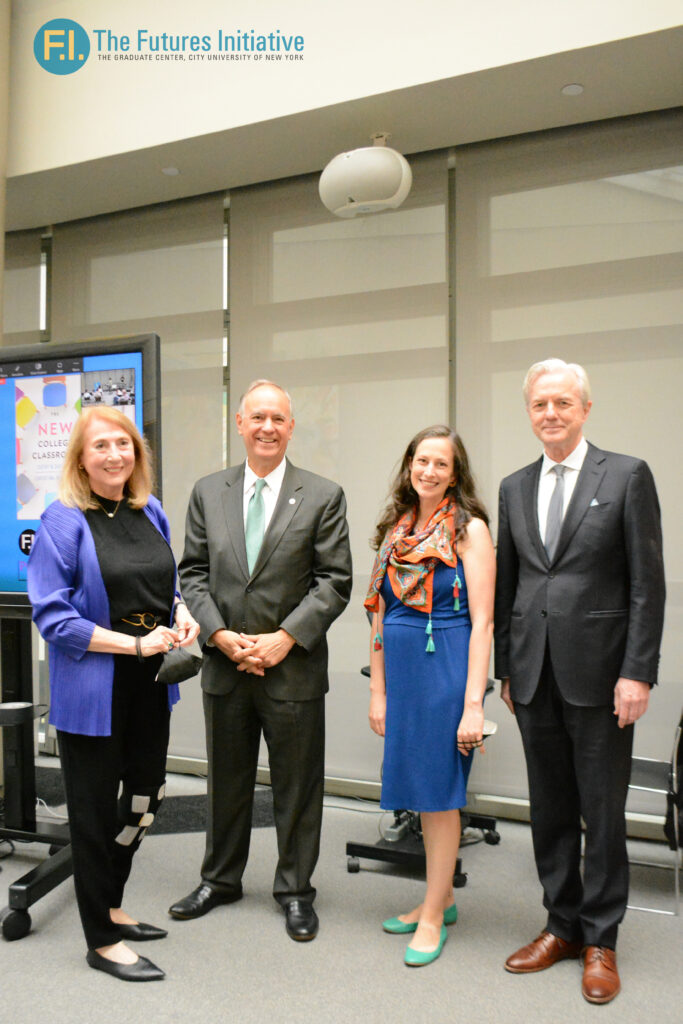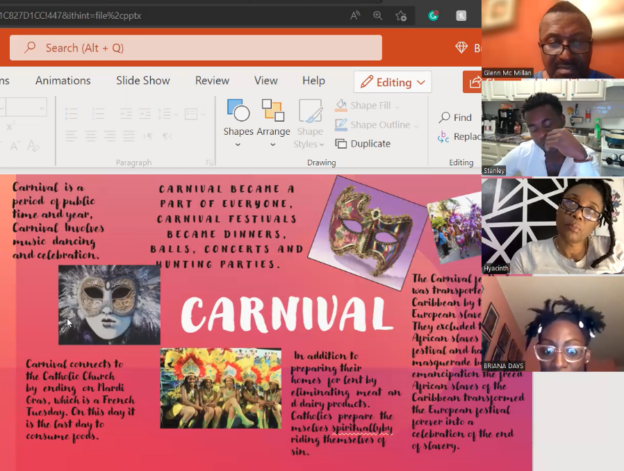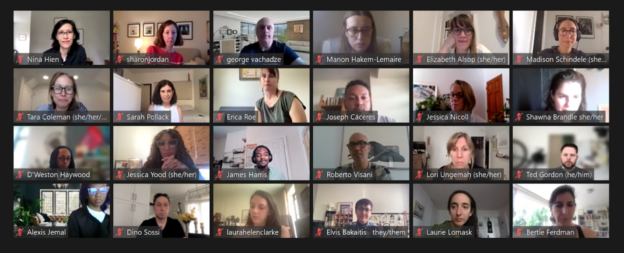On Saturday, November 5, 2022, I had the privilege of conducting a pedagogy workshop at the American Studies Association conference, with my esteemed TLH colleagues and mentors, Cathy Davidson, Shelly Eversley, Christina Katopodis, Javiela Evengelista, and Jason Hendrickson.
Anti-ableist pedagogy is a topic we’ve taken up in our TLH seminars over the past two years as another way to promote equity in the classroom. Anti-ableist pedagogy isn’t just about accessibility—making sure that all of your students can access and understand materials you use for teaching and that they can participate equally in the classroom—it’s also about recognizing and critiquing the harms caused by ableism in society and in our educational systems. It’s about accepting disability as part of human diversity and a positive identity marker, as opposed to a deficit, a reason for pity, or a justification for low expectations. Anti-ableist pedagogy is about radical acceptance of intersectional identities, unconditional respect, and a commitment to making everyone feel that their contributions are valuable.
In the workshop, we borrowed an exercise from Dr. Jamila Lyiscot, who led a TLH workshop last year. The rules of the exercise were to first choose a whistle-blower or gatekeeper to enforce the requirement to only speak with words that have 2 syllables or less. The question was, “please describe your research (or work).” One of our participants reported being so preoccupied with following the rules that they completely missed out on the content. This simple yet powerful exercise can demonstrate how people who learn differently or English language learners might be missing the most important parts of the conversation.
Turning to theory as another entry point into understanding ableism, we also explored models of disability, or the way that we conceptualize disability. The most commonly cited models are the medical model (defining disability as an impairment in the body in need of a cure) and the social model (defining disability as a social construction due to society’s failure to adapt to disabled bodyminds). While these models are necessarily at odds with each other, a universal model acknowledges that we have to acknowledge and accept different forms of impairment as a part of the human experience, while reforming the way that society responds to disabled people. Part of undoing the long history of oppression of disabled people starts with considering that disability is not unusual and it’s not a fixed state of being (anyone can become disabled at any time). Instead of creating separate spaces and policies for “accommodating” people with disabilities, we should be working to adapt our social environment to include everyone.
From there, we turned to defining ableism. For me, the dictionary definition falls short in describing the range of insidious behaviors towards disabled people that have been normalized by society, or the use of ability itself to undermine people based on other parts of their identities. Here, I turn to the work of activist, Talila Lewis, who concisely defines the term:
“A system that places value on people’s bodies and minds based on societally constructed ideas of normality, intelligence, excellence, desirability, and productivity. These constructed ideas are deeply rooted in anti-Blackness, eugenics, misogyny, colonialism, imperialism and capitalism.
This form of systemic oppression leads to people and society determining who is valuable and worthy based on a person’s language, appearance, religion and/or their ability to satisfactorily [re]produce, excel and “behave.”
You do not have to be disabled to experience ableism.”
a working definition by Talila “TL” Lewis*; updated January 2021
In taking a critical look at our built and social environments, it’s not hard to find areas where this system of placing value on individuals has been used to create structural inequalities for disabled people in our society, a fact that is especially apparent in our education systems. This can be taken literally when looking at architectural barriers or information barriers, or figuratively, when considering policies and rules that subtly (or not so subtly) discourage disabled students from succeeding.
In addition to talking about how disability is defined and the harms of ableism, we ended with some ways to practice anti-ableist pedagogy:
- Learn more about disability history and ongoing struggles for access to all parts of society. For example, much of the built world has been improved by disabled activists through what is known as the curb cut effect.
- Voice your support within your institution for spending money on structural access and information access. Accessibility is often an afterthought, given attention only when it becomes a problem, and deprioritized in budgets.
- Strive to create accessible learning environments through Universal Design for Learning (UDL)
- Understand that accessibility is often a negotiation between competing needs and therefore a process. Strive for an adaptable environment that can accommodate the people in your classroom.
- Consider giving everyone the most commonly requested accommodations (usually extra time for assignments and tests). This takes away the stigma associated with requesting disability accommodations and helps all students.
- Work with your campus accessibility office to make sure your course materials are accessible (text that is computer-readable is also flexible to accommodate people with a variety of vision disabilities and can be used with annotation tools that benefit neurodiverse students as well).
- Add an accessibility statement to your syllabus to signal to students that they can talk directly to you about their access needs. Be open to suggestions for improvement. Talk about disability and access as a normal part of the college experience.
- “Crip” the curriculum, or incorporate disability into readings and course content. Question ableism in literature and media, social policies, or other topics.
- Most importantly, practice “radical acceptance” of everyone for who they are (and meet them where they are).
Other resources from the session:
Our slides
Padlet asking participants WHY and HOW can the classroom be a radical space for antiracist action?
Small Axe/Acts (brainstormed with session participants)
Additional Suggested Readings on Anti-Ableist Pedagogy:
Articles:
Transformative Anti-Ableist Pedagogy for Social Justice, by 2021-2022 TLH Faculty Fellow, Dusana Podlucka
Anti-ableist pedagogies in higher education: A systems approach, by Juuso Nieminen and Henri Pesonen
Books:
For a good primer on disability, I recommend Demystifying Disability: What to Know, What to Say, and How to Be an Ally by Emily Ladau.
For more theoretical approaches to disability and intersectionality, see Disabled Futures: A Framework for Radical Inclusion by Milo W. Obourn and The Minority Body: A Theory of Disability by Elizabeth Barnes
